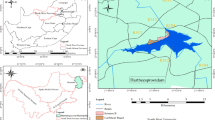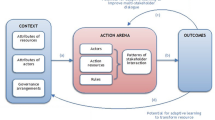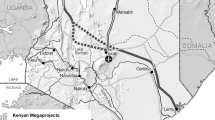Abstract
The South African National Department of Housing’s ‘Breaking New Ground: A Comprehensive Plan for the Creation of Sustainable Human Settlements’ was released in 2004. This policy directive acknowledged that informal settlements had grown significantly since 1994. It resulted in the development and implementation of the informal settlement upgrading programme across the country. The principle objective of the study discussed in this paper was to investigate the City of Cape Town’s (the City) rationale in the technique of upgrading the informal settlements of Makhaza and New Rest in Cape Town and explore the implications of this rationale for women’s social networks in these two settlements. The research has found that the rationale used by the City to plan and implement the upgrading of informal settlements is contradictory to the needs of the residents within these settlements. The settlements therefore do not meet the needs of the residents (particularly women) and do not enable or ensure the maintenance of strong social relationships which are crucial for the survival of livelihoods in these areas.
Similar content being viewed by others
References
Adlard, G. (2006). An evaluation of the new rest upgrade. Dissertation, University of Cape Town.
Angignu, N., & Huchzermeyer, M. (2009). Towards urban inclusion: Planact’s response to the phenomenon of informal settlements. Johannesburg: Planact.
Crampton, J., & Elden, S. (2007). Space, knowledge and power: Foucault and geography. Aldershot: Ashgate.
Dean, M. (2010). Governmentality: Power and rule in modern society (2nd ed.). London: Sage.
Department of Housing. (2004). A Department of Housing Study into supporting informal settlements. Pretoria: National Department of Housing.
Fieuw, W. (2011). Informal settlement upgrading in Cape Town’s Hangberg: Local Government, Urban Governance and the ‘Right to the City’. Master’s Thesis. Stellenbosch University.
Gribat, N. (2010). Governing the future of a shrinking city: Hoyerswerda, East Germany. PhD thesis, Sheffield Hallam University.
Huchzermeyer, M. (1999). Current informal settlement intervention in South Africa: Four case studies of people-driven initiative. Cape Town: CSIR Boutek.
Huchzermeyer, M. (2006). The new instrument for upgrading informal settlements in South Africa: Contributions and constraints. In M. Huchzermeyer & A. Karam (Eds.), Informal settlements. A perpetual challenge?. Cape Town: University of Cape Town Press.
Jolobe, Z. (2006). Things fall apart, can the centre hold? The state of coalition politics in the Cape Metropolitan Council. In U. Pillay, R. Tomlinson, & J. du Toit (Eds.), Democracy and delivery: Urban policy in South Africa. Cape Town: HSRC Press.
Lemke, T. (2000). Foucault, governmentality, and critique. Paper presented at Rethinking Marxism Conference, University of Amherst.
Mayhew, S. (Ed.). (2004). A dictionary of geography. Oxford: Oxford University Press.
McDonald, D. (2008). World city syndrome: Neoliberalism and inequality in Cape Town. London/New York: Routledge.
McDonald, D., & Smith, L. (2004). Privatising Cape Town: From apartheid to neo-liberalism in the mother city. Urban Studies, 41(8), 1461–1484.
Miraftab, F. (2007). Governing post apartheid spatiality: Implementing city improvement districts in Cape Town. Antipode, 39(4), 602–626.
Newton, C., & Schuermans, N. (2013). More than twenty years after the repeal of the group areas act: Housing, spatial planning and urban development in post-apartheid South Africa. Journal of Housing and the Built Environment. doi:10.1007/s10901-013-9344-7.
Rose, N., O’Malley, P., & Valverde, M. (2006). Governmentality. Annual Review of Law and Social Science, 2, 83–104.
Saff, G. (1994). The changing face of the South Africa city: From urban apartheid to the deracialization of space. International Journal of Urban and Regional Research, 18(3), 377–391.
Sliuzas, R. (2004). Managing informal settlements, a study using geo-information in Dar es Salaam, Tanzania. ITC Publication Series 112.
UNSTAT. (2005). http://unstats.un.org/unsd/environmentgl/gesform.asp?getitem=665.
Watson, V. (2002). Change and continuity in spatial planning: Metropolitan planning in Cape Town under political transition. London: Routledge.
Watson, V. (2003). Conflicting rationalities: Implications for planning theory and ethics. Planning theory and practice, 4(4), 395–408.
Wilkinson, P. (2004). Renegotiating local governance in a post‐apartheid City: The Case of Cape Town. Urban Forum, 15(3), 213–230.
Yose, C. (1999). From shacks to houses: Space usage and social change in a Western Cape Shanty town. Dissertation: University of Cape Town.
Acknowledgments
My thanks go to the people of Makhaza and New Rest for giving of their valuable time to participate in the study. Thank you to my ever willing research assistants for their help with the data gathering. Responsibility for any shortcomings of this paper remains with the author.
Author information
Authors and Affiliations
Corresponding author
Rights and permissions
About this article
Cite this article
Massey, R.T. Competing rationalities and informal settlement upgrading in Cape Town, South Africa: a recipe for failure. J Hous and the Built Environ 28, 605–613 (2013). https://doi.org/10.1007/s10901-013-9346-5
Received:
Accepted:
Published:
Issue Date:
DOI: https://doi.org/10.1007/s10901-013-9346-5




